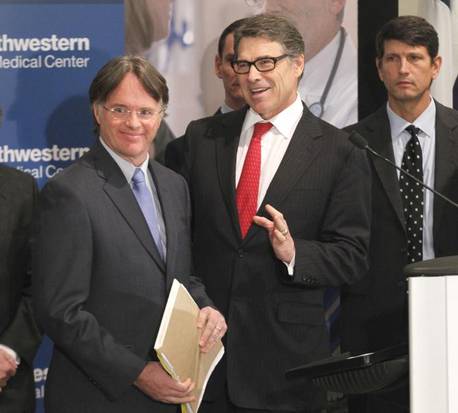As the number of people being monitored for Ebola continued to shrink in Dallas County, government leaders on Tuesday unveiled new measures to try to prevent future crises.
Gov. Rick Perry announced two sites, including one in Richardson, where new Ebola patients would be treated in Texas. And federal officials implemented new rules that would prevent travelers from West Africa from entering the U.S. through Dallas/Fort Worth International Airport.
Meanwhile, Dallas County health officials presented their own list of proposed changes to state law that they said would help them respond better to the next infection emergency.
County Judge Clay Jenkins said North Texas is looking safer with every passing day.
“I believe we are winning the fight against Ebola now,” he said.
Helping Presbyterian
If another person were to fall ill, he or she probably wouldn’t go Texas Health Presbyterian Hospital, where Dallas’ first three cases were treated. After having its first patient die and two of its nurses fall ill, the hospital needs some relief, officials said.
“That hospital has been on the front line,” Perry said. “They have paid a fairly heavy price.”
Instead, patients would be sent to one of two places: a center in Richardson operated by UT Southwestern Medical Center at Dallas or the University of Texas Medical Branch in Galveston.
“The goal of these facilities is to rival the most advanced facilities in the world,” Perry said at a news conference at UT Southwestern. “I don’t think there is a better institution in the world than UT Southwestern.”
The North Texas facility is housed in a building on West Campbell Road in Richardson that is owned by the Methodist Health System. However, doctors from UT Southwestern would staff the center, providing biocontainment expertise. Parkland Health & Hospital System would furnish the nurses and support staff.
The facility has an intensive care unit, 10 empty beds and special areas for health care workers to change into and out of protective gear. It could take in two new Ebola patients within the next 24 hours, said Dr. Sam Bagchi, chief medical information officer for the Methodist Health System.
“While Methodist wishes we would not be here today — having to deal with an Ebola situation in our community — we also recognize that stepping up in this special collaboration is the right thing to do,” Bagchi said.
Parkland’s past
The Richardson and Galveston facilities were proposed by the Texas Task Force on Infectious Disease Preparedness and Response, which Perry established this month.
However, widespread failures in infection control at Parkland Memorial Hospital in 2011 were among the reasons federal regulators installed safety monitors at the hospital.
UT Southwestern manages clinical care at Parkland and supplies the vast majority of its physicians. A 2013 investigation by The Dallas Morning News found that tense relations between the two institutions had jeopardized patient safety for years.
The problems at Parkland ranged from poor hand-washing practices to patient rooms that were filthy with overflowing trash bins, excrement and blood. The breakdowns were so severe that they placed patients in “immediate jeopardy,” according to the monitors’ first investigative report.
Last fall, Parkland passed a sweeping government health inspection, after spending nearly $100 million to implement 499 safety reforms, including new infection control measures.
Ideas for change
At a briefing Tuesday morning, county leaders listed several ideas for change.
Zachary Thompson, the county health director, lauded his department’s new ability to test for Ebola in its own laboratory. That could save valuable time and resources, since future samples would not have to be sent to the state lab in Austin.
Thompson recommended updating provisions of the state health code that deal with infectious diseases. One proposed change would be to make sure school officials and law enforcement agencies are informed if a person in their jurisdiction is placed in quarantine.
Meanwhile, the Obama administration announced that anyone arriving from Liberia, Sierra Leone or Guinea, three West African countries where the Ebola outbreak is worst, will have to enter the country through one of five airports: New York’s John F. Kennedy International, Newark Liberty, Washington’s Dulles International, Chicago’s O’Hare and Atlanta’s Hartsfield-Jackson. All have been equipped to screen travelers for signs of Ebola.
Impact on D/FW
More than 90 percent of those who arrive from West Africa already pass through one of those airports. For example, Thomas Eric Duncan, the Liberian who was the first person diagnosed with Ebola in the U.S. — and who died of the viral disease at Presbyterian — passed through Dulles on his way to Dallas.
Members of Texas’ congressional delegation had been asking that D/FW be added to the list of airports with special screenings. Under the new rules, however, there won’t be any West African travelers at D/FW who haven’t already been screened at one of the other U.S. airports.
Staff writers Todd J. Gillman in Washington and Miles Moffeit in Dallas contributed to this report.
nrajwani@dallasnews.com;
mwatkins@dallasnews.com











